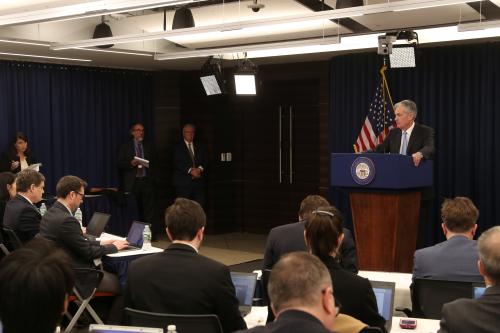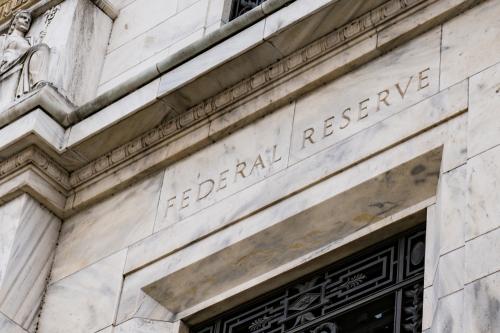Prior to the Great Recession, the roles of the U.S. Treasury and Federal Reserve in managing the nation’s $13-trillion debt were straightforward: The Treasury controlled the maturity of the debt and the Fed short-term interest rates.
But those lines were blurred after the Fed cut short-term interest rates to zero in late 2008 and began purchasing long-term Treasury debt (“quantitative easing”) to push down long-term interest rates. At the same time, the U.S. Treasury decided to lengthen the average maturity of the ever-larger government debt. So while the Fed was taking long-term Treasuries away from investors, the Treasury was pumping out more of them. In a new Brookings Institution Press book, The $13 Trillion Question: How American Manages Its Debt, Harvard’s Robin Greenwood, Samuel G. Hanson, Joshua S. Rudolph, and Lawrence H. Summers estimate that the Treasury’s decision to lengthen the maturity of the debt undid one quarter to one third of the impact of the Fed’s QE.
So should the Treasury and Fed coordinate on debt management policy in order to avoid working at cross purposes in the future?
“Yes,” say Greenwood, Hanson, Rudolph, and Summers. They propose an arrangement that would have the Federal Reserve and Treasury release an annual l joint statement on debt management strategy, but allow the Fed to engage in asset purchases if unforeseen changes in the economic situation arise.
“No,” says Charles Evans, president of the Federal Reserve Bank of Chicago. At a recent discussion—sponsored jointly by the Hutchins Center on Fiscal and Monetary Policy at Brookings and the Initiative on Global Markets at the University of Chicago Booth School of Business – Mr. Evans argued that more cooperation between the Fed and Treasury would blur the line between fiscal and monetary policy, possibly damaging central bank independence to pursue its twin mandates of price stability and maximum sustainable employer. “Our current system has served us well in my opinion, so the bar should be high for making major changes, and risking independent decision making is a big step,” he said.
Seth Carpenter, acting assistant Treasury secretary for financial markets, expressed similar sentiments:
Presumably, changes in interest rates affect interest expense on the debt, which has a direct effect on the deficit…would you support the notion that the Federal Reserve should not raise interest rates in pursuit of its objectives because it would have an adverse effect on the deficit?… Does it make sense to conduct monetary policy so as to maximize the earnings to increase remittances to the treasury and lower the deficit? I suspect that your answer to that would be, ‘No.’
Just as policy coordination could jeopardize Fed independence, it also could complicate the Treasury’s primary objectives of funding the government at a low cost and acting in a “regular and predictable” manner, he said.
For more on the The $13 Trillion Question, click here.
The Brookings Institution is committed to quality, independence, and impact.
We are supported by a diverse array of funders. In line with our values and policies, each Brookings publication represents the sole views of its author(s).



Commentary
Debt management–(how much) should the Fed and Treasury coordinate?
December 7, 2015